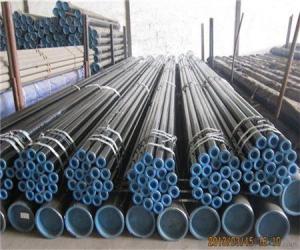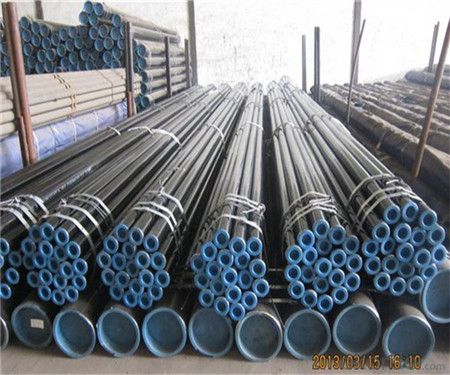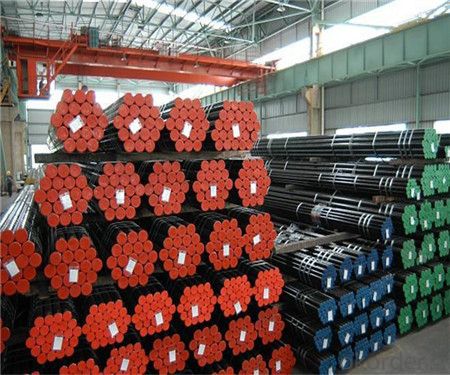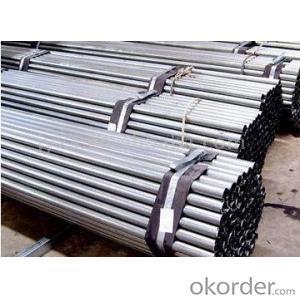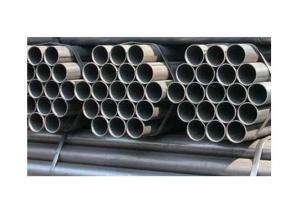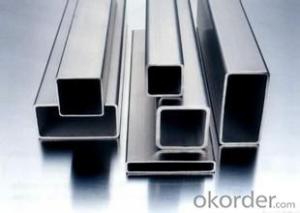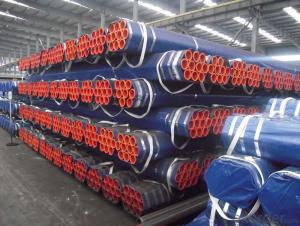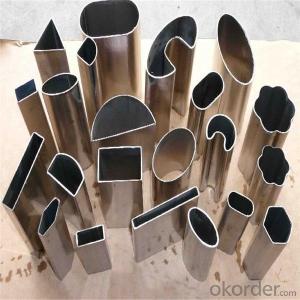China Seamless Steel Pipe/Tube Tubing and Casing Pipe Factory
- Loading Port:
- Tianjin
- Payment Terms:
- TT OR LC
- Min Order Qty:
- 20 m.t.
- Supply Capability:
- 12000 m.t./month
OKorder Service Pledge
OKorder Financial Service
You Might Also Like
Product Description:
▲ Line pipe
▲ Tubing and casing
▲ L & M & H boiler tube
▲ Gas cylinder tube & pipe
▲ Mechanical & Structural pipe
▲ Ship-building tube & pipe
▲ Automobile tube & pipe
TUBING AND CASING PIPE
Standard: APL SPEC 5CT
● Application:
Tubing is used to extracting extract petroleum and
natural gas from a well.
Casing serves as walls of well.
2、Main Features of the Seamless Pipe :
• High manufacturing accuracy
• The higher strength
• The small inertia resistance
• Strong heat dissipation ability
• Good visual effect
• Satisfy price
3、Seamless Pipe ASTM DIN1829 Specification:
Standard | GB, DIN, ASTM ASTM A106-2006, ASTM A53-2007 |
Grade | 10#-45#, 16Mn 10#, 20#, 45#, 16Mn |
Thickness | 8 - 33 mm |
Section Shape | Round |
Outer Diameter | 133 - 219 mm |
Place of Origin | Shandong, China (Mainland) |
Secondary Or Not | Non-secondary |
Application | Hydraulic Pipe |
Technique | Cold Drawn |
Certification | API |
Surface Treatment | factory state or painted black |
Special Pipe | API Pipe |
Alloy Or Not | Non-alloy |
Length | 5-12M |
Outer Diameter | 21.3-610mm |
Grade | 20#, 45#, Q345, API J55, API K55, API L80, API N80, API P110, A53B |
Standard | ASME, ASTM |
1) Material:20#(ASTM A 106/A53 GRB.API5LGRB,GB),45#,16Mn,10#.
2) Specification range:OD:21.3-610mm,WT:6-70mm,length:6-12m or according to the requirement of clients.
3) Excutive standards:GB,ASME API5L.ASTM A 106/A53,Despite of the above standards,we can also supply seamless steel pipe with standard of DIN,JIS,and so on,and also develop new products according to the requirements of our clients!
4) Surface:black lacquered,varnish coating or galvanized.
5) Ends:Beveled or square cut,plastic capped,painted.
6) Packing:bundles wrapped with strong steel strip,seaworthy packing.
4、Packaging & Delivery
Packaging Details: | seaworthy package,bundles wrapped with strong steel strip |
Delivery Detail: | 15-30days after received 30%TT |
5、FAQ of Seamless Pipe ASTM DIN1829:
①How is the quality of your products?
We have many years business experience in this area, and we have professional engineer and manager team and sure we can provide you high quality production and professional service.
②How about price?
Yes, we are factory and be able to give you lowest price below market one, and we have a policy that “ for saving time and absolutely honest business attitude, we quote as lowest as possible for any customer, and discount can be given according to quantity”,if you like bargain and factory price is not low enough as you think, just don’t waste your time.Please trust the quotation we would give you, it is professional one.
③Why should you chose us?
We can give you both.Additionally, we can also offer professional products inquiry, products knowledge train(for agents), smooth goods delivery, exellent customer solution proposals.Our service formula: good quality+good price+good service=customer’s trust
SGS test is available, customer inspection before shipping is welcome, third party inspection is no problem
our advantage:
Professional teams ensure a high efficiency of your purchase
▲ Professional sales team
▲ Professional engineering and technology team
▲ Professional exportation and contract processing/management team
▲ Professional cooperators and partners
6、Seamless Pipe Images:
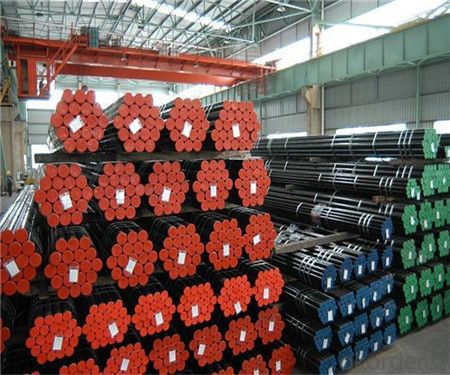
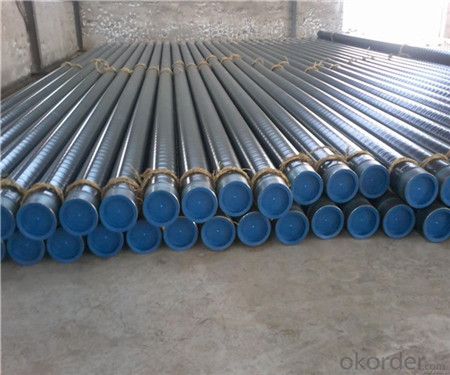
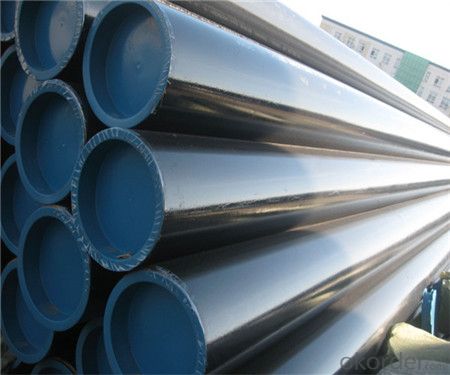
- Q: How are steel pipes threaded for easy installation?
- Steel pipes are threaded for easy installation using a process called threading. Threading involves cutting grooves or ridges into the pipe to create a spiral pattern. This pattern allows the pipe to easily connect with other threaded components, such as fittings or valves. There are two common methods used to thread steel pipes: manual threading and machine threading. In manual threading, a handheld tool called a pipe die is used. The die is equipped with sharp teeth that cut into the pipe as it is rotated. The pipe is secured in a vise or held firmly by hand, and the die is applied to the end of the pipe. The die is then rotated around the pipe, creating the threaded grooves. This process requires skill and precision to ensure accurate and properly aligned threads. Machine threading, on the other hand, is a more automated process. It involves the use of a pipe threading machine, which is equipped with a die head that automatically cuts the threads into the pipe. The machine secures the pipe and rotates it while the die head moves along the length of the pipe, cutting the threads. Machine threading is faster and more efficient than manual threading, making it ideal for large-scale production or projects. Regardless of the method used, it is crucial to ensure that the threads are clean and free from debris or burrs. This is important for easy installation and to prevent leaks or other complications. After threading, the pipes are typically inspected to ensure the threads meet the required specifications. Threading steel pipes allows for easy installation as the threaded ends can be easily screwed into fittings, valves, or other pipes with compatible threads. This threaded connection creates a tight seal, making it suitable for various applications, such as plumbing, gas lines, or industrial piping systems.
- Q: Seamed steel pipe seamless steel pipe, carbon steel pipe, galvanized pipe, four how to distinguish between
- Seamless steel tube processing technology:1.1 、 hot rolled seamless tubes are usually produced on automatic rolling mills. After checking and cleaning the surface defects, the solid tube is cut into the required length, centring on the end face of the tube blank, then sent to the heating furnace and punched on the piercer. At the same time, the hole rotates and advances continuously. Under the action of the roller and the plug, the inner cavity of the pipe blank is gradually formed, and the cavity is called the capillary. Sent to the automatic tube rolling mill on rolling. Finally, the thickness of the whole machine is the same, and the diameter of the sizing machine is determined to meet the specifications. It is an advanced method to produce seamless steel tube by continuous rolling mill.1.2, in order to obtain smaller size and better quality of seamless tube, cold rolling, cold drawing method must be used or combined. Cold rolling is usually carried out on a two roller mill, where the steel tube is rolled in the annular groove made of variable cross section, round hole groove and stationary conical head. Cold drawing is usually performed in single chain or double chain cold drawn machines from 0.5 to 100T.1.3, the extrusion method will soon heat the tube blank in the closed extrusion cylinder, the perforation bar and extrusion rod movement, so that extrusion parts from the smaller hole extrusion. This method can produce smaller diameter steel pipe.Seamless steel pipe use: mainly used to transport fluid pipeline or structural parts.The main use of steel pipe joints (steel) two welded together, so the price is cheap, widely used.
- Q: How do you determine the required wall thickness for steel pipes?
- The required wall thickness for steel pipes is determined through various factors and calculations. One of the primary considerations is the pressure that the pipe will be subjected to. The higher the pressure, the thicker the wall needs to be to ensure the pipe can withstand the internal forces. Another important factor is the material strength of the steel used for the pipe. Different grades of steel have varying tensile strengths, which affect the required wall thickness. The tensile strength is the maximum amount of stress a material can withstand before it fails, so it is crucial to select a steel grade that can handle the expected pressure. Additionally, the pipe's diameter plays a role in determining the required wall thickness. Larger diameter pipes generally require thicker walls to maintain structural integrity and prevent deformation under pressure. To calculate the required wall thickness, engineers use industry standards and formulas. The most commonly used standard is the American Society of Mechanical Engineers (ASME) B31 code, which provides guidelines for designing pressure piping systems. The ASME code incorporates factors such as safety margins, material properties, and pressure ratings to determine the appropriate wall thickness. Furthermore, other considerations such as temperature, corrosion, and external loads may also influence the required wall thickness. For example, high-temperature applications may require thicker walls to prevent the pipe from buckling or becoming too soft. In summary, determining the required wall thickness for steel pipes involves considering factors such as pressure, material strength, diameter, temperature, and other external forces. Engineers rely on industry standards and calculations to ensure the pipe can withstand the intended operating conditions safely.
- Q: What are the common protective coatings used on the inner surface of steel pipes?
- The common protective coatings used on the inner surface of steel pipes include epoxy, polyurethane, and cement mortar coatings. These coatings provide corrosion resistance, prevent the formation of scales, and improve the durability and lifespan of the pipes.
- Q: How long do steel pipes typically last?
- Steel pipes typically have a lifespan of 50 to 100 years, depending on various factors such as the quality of the steel, installation conditions, maintenance, and exposure to corrosive elements.
- Q: Are steel pipes suitable for use in pharmaceutical industries?
- Yes, steel pipes are suitable for use in pharmaceutical industries. Steel pipes are known for their durability, strength, and resistance to corrosion, making them ideal for transporting various pharmaceutical materials and fluids safely and hygienically. Additionally, steel pipes can withstand high pressure and temperature conditions, ensuring the integrity and efficiency of pharmaceutical manufacturing processes.
- Q: Can steel pipes be coated for aesthetic purposes?
- Yes, steel pipes can be coated for aesthetic purposes. Coatings such as paint, powder coating, or galvanizing can be applied to steel pipes to enhance their visual appearance and protect them from corrosion. These coatings can provide a variety of colors and finishes to suit different aesthetic requirements.
- Q: How are steel pipes coated to prevent external corrosion?
- Steel pipes are commonly coated to prevent external corrosion through various methods such as galvanization, epoxy coating, or polyethylene wrapping. These coatings act as barriers between the steel surface and the external environment, protecting the pipes from moisture, chemicals, and other corrosive elements.
- Q: What are the advantages of using steel pipes in the manufacturing industry?
- There are several advantages of using steel pipes in the manufacturing industry. Firstly, steel pipes are known for their high strength and durability, making them ideal for carrying heavy loads and withstanding harsh conditions. Secondly, steel pipes have excellent resistance to corrosion, reducing the risk of leaks and ensuring a longer lifespan. Additionally, steel pipes offer a wide range of sizes and shapes, allowing for flexibility in design and easy customization. Furthermore, steel pipes are cost-effective compared to other materials, as they require minimal maintenance and have a low risk of failure. Lastly, steel pipes are environmentally friendly, as they are fully recyclable and contribute to reducing carbon emissions during manufacturing. Overall, the advantages of using steel pipes in the manufacturing industry make them a reliable and efficient choice for various applications.
- Q: How are steel pipes classified based on their wall thickness?
- Steel pipes are classified based on their wall thickness into three categories: standard weight, extra-strong, and double extra-strong.
Send your message to us
China Seamless Steel Pipe/Tube Tubing and Casing Pipe Factory
- Loading Port:
- Tianjin
- Payment Terms:
- TT OR LC
- Min Order Qty:
- 20 m.t.
- Supply Capability:
- 12000 m.t./month
OKorder Service Pledge
OKorder Financial Service
Similar products
Hot products
Hot Searches
Related keywords
